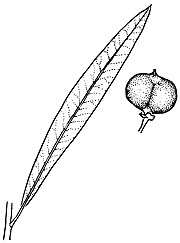Common name: Western Rosewood, Bonaree
Alectryon oleifolius (Desf.) S.T.Reynolds APNI* 
Description: Small tree with new growth silky, branches and leaves usually pendent.
Leaves simple, linear to narrow-elliptic or narrow-obovate, 3–15 cm long, 5–20 mm wide, apex acute to acuminate, base attenuate, margins entire, glabrous to densely hairy; petiole 5–16 mm long.
Inflorescences to 9 cm long. Petals absent.
Capsule ± obcordate, usually 2-lobed, c. 8 mm long, 10–15 mm wide; pericarp thin, crustaceous; seed black, aril red.
Distribution and occurrence: Widespread in semi-arid areas, west from upper Hunter Valley.
NSW subdivisions: NWS, CWS, NWP, SWP, NFWP, SFWP
Other Australian states: Qld Vic. N.T. S.A. W.A.
Text by G.J. Harden
Taxon concept:
| | Key to the subspecies | |
| 1 | Fruit, calyx and leaves usually densely hairy; inflorescences usually 1–9-flowered. Leaves mostly 5–9 cm long, 4–16 mm wide, greyish; petiole 2–16 mm long. Pedicels 5–14 mm long. Capsule lobes compressed, pubescent | subsp. canescens |
| Fruit, calyx and leaves glabrous or finely hairy; inflorescences with 5–53 or more flowers. Leaves mostly 6–15 cm long, 4–10 mm wide, green; petiole 5–15 mm long. Pedicels 1.5–5 mm long. Capsule lobes globose, glabrous | subsp. elongatus |
APNI* Provides a link to the Australian Plant Name Index (hosted by the Australian National Botanic Gardens) for comprehensive bibliographic data
***The AVH map option provides a detailed interactive Australia wide distribution map drawn from collections held by all major Australian herbaria participating in the Australian Virtual Herbarium project.
|


